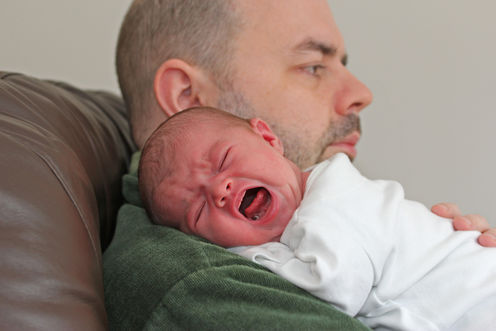
Colic is a term used to describe a baby who is well, but who cries an excessive amount of the time.
Formal definitions describe it as a well-fed and otherwise well infant less than three months old who cries for more than three hours per day, for more than three days per week, for at least three weeks. Babies are affected from around three weeks of age, and usually improve by around three months.
Colic is often worse in the early evening and can affect up to 20% of babies.
Caring for babies with excessive crying or colic is very difficult, worrying, tiring and frustrating for parents.
Working out what is causing the crying and how to make a difference is not easy. Multiple factors are likely at play. As a result, treatment options are not very well understood – what works for one baby may not work for another.
Is it the gut?
One popular explanation is that there is an increase of gas or other irritation in the gut causing windy pain and discomfort. The type of feeding doesn’t seem to influence whether a baby gets colic, but it does affect treatment suggestions. Adjusting a baby’s diet or gut bacteria to try to reduce any gas build up is often tried.
If a baby is breast-fed, some suggest adjusting mum’s diet to reduce any allergens (in particular dairy food), which may irritate the baby’s gut. There is no clear evidence these changes make any significant difference. The risk of following these dietary changes is reducing nutrition for mum, and hence baby. Changing from breast feeding to formula feeding to treat colic is not advised.
If a baby is exclusively formula-fed, a trial of an alternative formula may be given. In particular, trying a formula where the milk proteins have been broken down to improve absorption (hydrolysed) may be helpful.
Different types of bacteria are found in the gut of a colicky baby compared to a baby without colic. To try to rectify this, probiotic supplements have been trialled in babies with colic.
Although one recent study showed no effect, there is generally a trend toward reduced duration of crying time in babies treated with probiotics, in particular, L.Reuteri. Probiotics are safe for use in babies, and may help reduce the features of colic.
Is my baby overstimulated?
Another explanation is that by the end of the day, the baby (used to the peace and quiet of the uterus for so many months) has “had enough”. Supporters of this theory advise parents to reduce stimulation of their baby to improve crying.

In practical terms, this means keeping the baby away from bright lights and loud noises (and relatives), and lightly wrapping the baby.
The research on these interventions is split. Some studies show a reduction in crying.
Provided a caregiver is still nearby or with the baby, there is little harm in this intervention, and it may be of benefit.
Is it a migraine?
Migraines are often inherited. Mothers with migraines are more likely to have babies with colic, and colicky babies are more likely to have childhood migraines. It makes sense that some babies with colic may have a form of migraine.
Children with migraines often improve with reducing external stimuli, including turning down noise and lights, avoiding strong smells and going to sleep. Similar management can be applied to babies. This correlates well with the management of the “overstimulated baby” described above.
Medications can be of use in migraines, but in general they are avoided in babies due to safety concerns, and the potential for the medications themselves to worsen the migraine.
What about colic medications?
The only medication which has proven benefit in the treatment of colic (dicyclomine) comes with several serious side-effects including breathing difficulties, seizures and coma. It is unlicensed for use in babies in several countries.
Other over-the-counter medications have not been proven to reduce crying.
Tea containing fennel may make some improvement, but the associated side-effects such as vomiting and loss of appetite may have negative effects on a baby’s nutrition.
Some other herbal preparations for colic have been found to have serious side-effects such as liver failure and should be avoided.
Chiropractice?
Although chiropractic care may be promoted as a treatment for colic, multiple reviews demonstrate any studies showing any benefit are not well designed.
Well-designed studies show no benefit of chiropractic treatment over being held by a nurse.
Worrying possible side effects such as rupture of arteries in the neck add to the advice that chiropractic treatment is not recommended in the treatment of colic.
So what can I do?
Time cures colic. In the meantime, probiotics are a safe treatment, reducing stimulation may help a baby settle, a trial of hydrolysed formula may help (but don’t change to formula if you are breastfeeding) and other medications should be avoided.
Seek support. Caring for a baby with colic is hard. There is a higher rate of dangerous actions such as shaking, smothering and slapping in crying colicky babies. Family and community supports differ in each area, but talking to your health-care professional will help you find support in your local area.
Remember, crying can be caused by many things, not just colic. If you are worried about your baby, it is very important to have your baby checked by a doctor or nurse before assuming this is colic.
Kirsten Thompson does not work for, consult, own shares in or receive funding from any company or organization that would benefit from this article, and has disclosed no relevant affiliations beyond the academic appointment above.
